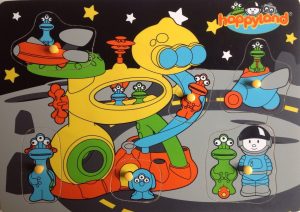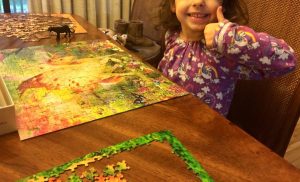Parents and caregivers can give kids outer space in something just a little bigger than a piece of paper. How? With some space puzzles for kids.

We might dismiss puzzles as a rather old-fashioned toy that isn’t all that relevant anymore. After all, puzzles have been around for more than two hundred years. But they still provide great fun and learning.
A possible play-of-the-day for your child could be playing with puzzles. The puzzles don’t have to be space puzzles, they could be other kinds of pictures. Whatever ones are available, as little hands move pieces to make them fit, they are essentially exploring space.
Following is a short list (from a previous post) of what’s happening as kids play with puzzles:
-
problem-solving: Finding where each piece fits is a mini problem. What strategies does your child use to come up with a solution?
-
noticing details: Kids learn to look at the color, size and shape of pieces.
-
spatial skills: As little hands match the pieces to the spaces, brains are learning to do the same thing. (Some adult brains can tell if a sofa fits in a space just by looking but some have to move it.) The ability of children to manipulate shape and space mentally is an important predictor of later skill in this area and playing with puzzles can help build this.
-
memory: Children will do a puzzle over and over and stretch their memories remembering which pieces fit where, what the finished picture looks like, and more.
-
muscle development. The small muscles in the hand and arm are developing and need lots of experiences making small movements.
-
hand-eye coordination: Getting fingers and hands to coordinate with brain instructions can be tricky.
-
attention and concentration: A puzzle is very patient and will still be there as children get distracted but at the same time, eyes and hands remind kids to return to the puzzle.
-
satisfaction and confidence: Kids feel pleased when they finish a puzzle and this boosts confidence in their abilities.

Putting a puzzle together can use quite a bit of space, depending on the size and number of pieces. Is there some space in your child’s day for play with space puzzles for kids?
